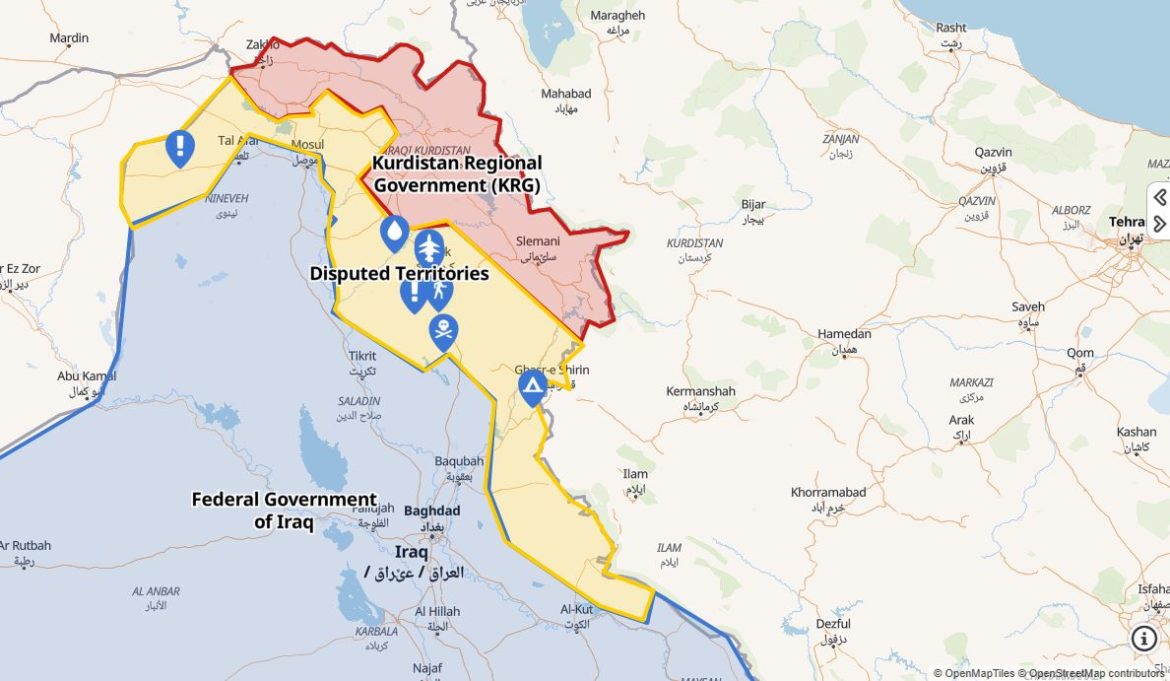1.3K
A weekly brief of events and news occurred in the disputed territories.
Kirkuk
- On January 30, the Kirkuk police command launched a “disarmament campaign.” The process takes several months and involves registering citizens’ weapons at police stations to record weapon ownership to the authorities. Kirkuk police have warned that anyone who does not register their guns will “face severe legal prosecution,” and its owner will be “suspected by the security forces in the event of any security breach.” After the campaign, the police will launch home searches for unregistered weapons.
- On February 1, the federal police withdrew from Kirkuk province and were replaced by two Iraqi army brigades. The army brigades have arrived in the Daquq district and Rashad subdistrict. According to the agreement between Erbil and Baghdad, the security of the cities in the disputed territories will be in the hands of the local police, while the army will be in charge of the outskirts.
- On January 29, a man found an Unmanned Aerial Vehicle (UAV) on his roof in the Rawan residential community. The drone was discovered when the owner of the home went to the rooftop and saw a drone lying on the ground. The drone appeared to be a combat drone capable of carrying small rockets and thermal surveillance cameras. Security agencies arrived at the scene and removed the drone. No foreign or local Iraqi forces have claimed ownership of the vehicle.
- On January 30, Turkmen residents of the Daquq district demonstrated publicly, causing the closure of the mayor’s office. The demonstration was against Acting Governor Rakan al Jabouri for appointing an Arab resident of Hawija as the new mayor. Earlier on January 24, Kurds threatened to hold a protest against al Jabouri’s decision, but the Iraqi prime minister annulled the appointment. For the first time since October 16, 2017, Kurds and Turkmen have agreed on an issue of the Arabization imposed by Baghdad and the local administration.
- The Central Bank of Iraq (CBI) has decided to open bank branches at airports across the country – excluding Kirkuk – to sell US dollars at official rates to tourists. The Rafidin, Rashid, and TBI banks will open branches in all airports except those in Kirkuk. The process has been going on for three days, and each tourist can buy 5,000 USD at the government price provided to all destinations not countries sanctioned by the United States. The exchange rate of the US dollars between the market and the government rates is about 20,000 Iraqi dinars per 100 dollars.
- According to the State Organization for Marketing of Oil (SOMO) statistics, in January 2023, 22,475,516 barrels of oil were exported from Kirkuk oil fields through the Cihan Pipeline. The gross revenue was $86,257,823, and the average oil price was $75.24 USD per barrel. In January, Jordan exported 309,529 barrels from Kirkuk, grossing $20,670,346 at an average price of $66.78 per barrel. The export revenues of Januruay via both Jordan and Turkey totaled $206,928,169 USD.
Khanaqin
- On January 31, the Iranian regime suspended electricity supply to the Diyala province, including Khanaqin, due to “gas issues.” However, unconfirmed reports suggest that Baghdad can not pay for the electricity fees in US dollars, but must do so in Iraqi dinars. In response, the Iranian government has cut off electricity and is reluctant to abide by the restriction. The Iraqi government has been buying electricity from Iran to supply Diyala province for years.
Tuz Khurmatu
- On January 30, ISIS (Da’esh) terrorists raided a house in the village of Yangija in the Tuz Khurmatu district and kidnapped a shepherd. According to the security media cell, the terrorists entered the town in the morning and kidnapped the shepherd. To generate income, the terrorist organization has kidnapped shepherds in rural areas and released them on large ransoms.
Sinjar (Shingal)
- On February 1, Hollywood star Angelia Jolie and the Yazidi Kurdish Human Rights activist Nadia Murad visited the Kajo village where Da’esh terrorists committed genocide against the Yazidis in 2014. Their visit took place away from the press. Actress Jolie called for international support for the survivors. Murad is from Kojo village, where most Da’esh atrocities were committed. Separately, on January 29, the Kurdistan Regional Government (KRG) Statistics and Information Office reported that 150,000 Yazidis have returned to their homeland since the liberation of the district in 2016, and about 100,000 have fled abroad. That said, there are thousands of families in the Kurdistan region’s displaced camps due to the lack of primary services and security in the Yazidi district. On January 31, Iraqi Minister of Displacement and MigrationIvan Ivan Jabro announced the return of 39 Yazidi families to their homeland. However, Dian Jaafar, Director of Displaced and Refugees in Duhok, told Shafaq News that only 39 families returned during the planned first batch of 96 families.

